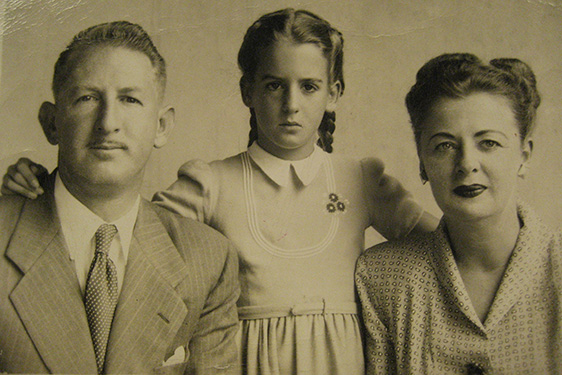
David Francis Dodge was born on August 18, 1910, in Berkeley, California, the youngest child of George Andrew Dodge, a San Francisco architect, and Maude Ellingwood Bennett Dodge. He and his three older sisters attended school in Berkeley while his father enjoyed a successful career helping to rebuild San Francisco in the years following the 1906 earthquake and fire. Tragedy struck, however, on July 31, 1919—just weeks before David’s ninth birthday—when the automobile that George was riding in collided with a Southern Pacific train in the tiny San Joaquin County town of French Camp. George was killed instantly.
Shortly after George’s death, Maude relocated the family to Southern California where David attended high school in Los Angeles. In order to help support his mother, he dropped out of school at the age of sixteen, took a job as a bank messenger, and began night classes at the American Institute of Banking. David clearly had a head for figures; within just a few short years he achieved the position of bookkeeper for the bank’s commercial accounts. In 1931, he grew tired of the banking business and shipped out with the Grace Steamship Company, starting out as an oiler and working his way up to fireman on a steamer running back and forth to Chile. He came ashore in San Francisco in 1933 and worked as a stevedore and night watchman on the docks for a year before taking a job with the San Francisco accounting firm of McLaren, Goode & Co., becoming a certified public accountant three years later.
At the same time, David began frequenting Macondria, a little theater that was home to a group of amateur playwrights and actors called the Macondray Lane Players. Macondria, founded in 1927 by George Henry Burkhardt, was part of San Francisco’s burgeoning little theater community in the 1930s and was located in the basement of Burkhardt’s house at 56 Macondray Lane on Russian Hill. David was introduced to the company by his oldest sister Kathryn, who would marry Burkhardt in 1937. Macondria was home to 120 premieres of original plays in its ten years of existence, including a one-act play called “Propaganda Preferred,” which debuted on the Macondria stage in March 1934 and marked the beginning of David Dodge’s writing career. Another Dodge-penned play, “A Certain Man Had Two Sons,” won first prize in the Northern California Drama Association’s annual one-act play competition in 1936. It was subsequently published by Banner Play Bureau in San Francisco, and Dodge saw his name in print for the first time.
That same year, David married Elva Keith, a Pacific Coast editorial representative for the Macmillan Company, and they moved into a house at 121 Nineteenth Avenue in San Francisco’s Richmond District, near the Presidio. Their only child, a daughter named Kendal, was born in 1940.
David Dodge’s career as an author really began, however, when he made a bet with Elva that he could write a better mystery novel than the ones they were reading during a rainy vacation. The resulting story featured a San Francisco tax accountant named James “Whit” Whitney and was titled—perhaps inevitably—Death and Taxes. Venerable San Francisco newspaper columnist Herb Caen noted, in his San Francisco Chronicle column, that the novel shared some qualities with the books of Dashiell Hammett: “Macmillan will bring out … a moiduh mystery with a Thin Mannish S.F. background; it’s called Death and Taxes, and was written by David Dodge, a local accountant, f’goshsakes.”
When the book was published in 1941, Dodge won five dollars from Elva and three more Whitney novels appeared over the next five years.
After the attack on Pearl Harbor, Dodge joined the US Naval Reserve and earned his first commission in October 1942 in the Office of the Supervisory Cost Inspector, 12th Naval District, San Francisco. He emerged three years later with the rank of Lieutenant Commander. Following his discharge, having grown tired of holding down a desk job during the day and writing at night, David Dodge packed his wife Elva and five-year-old daughter Kendal into the family car and headed south for Guatemala via the Pan American Highway through Mexico.
This move precipitated the start of not only Dodge’s second detective series, featuring Al Colby, an expatriate private investigator and tough-guy adventurer based in Latin America, but also his second career as an inveterate world traveler—a career he successfully combined with his job as a writer and turned into a string of self-deprecating humorous travel books that chronicle the Dodge family’s journeys and (mis)adventures in foreign lands. His first “travel diary,” How Green Was My Father, was published in 1947 and marked his first appearance on the New York Times bestseller list.
In 1950, the Dodge family landed on the glittering Côte d’Azur, in the south of France, where they rented a villa at just about the same time that a daring and acrobatic cat burglar appeared on the scene, stealing jewels from the rich and famous. When the thief struck at the villa next door, Dodge, who was briefly suspected of being the culprit himself, saw the basis for a story that was “so much stranger than truth that it cried out to be immortalized between hard covers.” The ensuing novel, To Catch a Thief, he claimed, practically wrote itself and was “the easiest eighty thousand words ever put together.”
With the success of To Catch a Thief, which was adapted into the classic film of the same name by Alfred Hitchcock with Cary Grant and Grace Kelly in the starring roles, Dodge abandoned series fiction and shifted his focus in the next decade from detective mysteries to taut international suspense thrillers in which ordinary American protagonists are thrust into extraordinary situations in foreign locales. His later books consistently garnered favorable reviews and sold well enough that he and Elva could keep traveling and living abroad (with the exception of four years spent in Princeton, New Jersey while Kendal was in high school).
Ever the accountant, a recurring theme of Dodge’s travel books is his attempts to extract the last drop of value out of every dollar—or peso or franc or drachma, as the case may be. A self-described “nickel-nurser” and “skinflint,” his most successful book was called The Poor Man’s Guide to Europe, which was published in 1953, spent fifteen weeks on the bestseller list, and appeared in annual revised editions through 1959. The Dodges’ travel budget was supplemented by a steady stream of articles written for Holiday magazine and a deal with Pan American Airways that provided them with free airfare.
In 1968, the Dodges returned to Mexico—the scene of their first adventures on the road—and finally settled down in San Miguel de Allende. A practical guidebook to Mexico, timed to take advantage of the upcoming Olympic Games in Mexico City, soon followed. Dodge returned both to series fiction and plots revolving around financial intrigue with two novels featuring a US Treasury Department special agent named John Abraham Lincoln. However, declining sales and failing health—both Elva’s and his own—led to his final novel, The Last Match, remaining unpublished at his death. The manuscript languished until 2006, when Hard Case Crime resurrected it.
Elva died on October 17, 1973. David died less than a year later on August 8, 1974. They are both buried in San Miguel de Allende.
Books by David Dodge
Novels
- Death and Taxes (1941)
- Shear the Black Sheep (1942)
- Bullets for the Bridegroom (1944)
- It Ain’t Hay (1946)
- The Long Escape (1948)
- Plunder of the Sun (1949)
- The Red Tassel (1950)
- To Catch a Thief (1952)
- The Lights of Skaro (1954)
- Angel’s Ransom (1956)
- Loo Loo’s Legacy (1960)
- Carambola (1961)
- Hooligan (1969)
- Troubleshooter (1971)
- The Last Match (2006)
Travel Books
- How Green Was My Father (1947)
- How Lost Was My Weekend (1948)
- The Crazy Glasspecker (1949)
- 20,000 Leagues Behind the 8-Ball (1951)
- The Poor Man’s Guide to Europe (1953)
- Time Out For Turkey (1955)
- The Rich Man’s Guide to the Riviera (1962)
- The Poor Man’s Guide to the Orient (1965)
- Fly Down, Drive Mexico (1968)
Links
“The Easiest Eighty Thousand Words Ever Put Together”: The Story Behind the Story of David Dodge’s To Catch a Thief, The Rap Sheet, August 5, 2020.
The Book You Have to Read: Carambola by David Dodge, The Rap Sheet, April 26, 2013.
A Conversation with Randal S. Brandt, Lowestoft Chronicle, Issue 10, June 2012.
